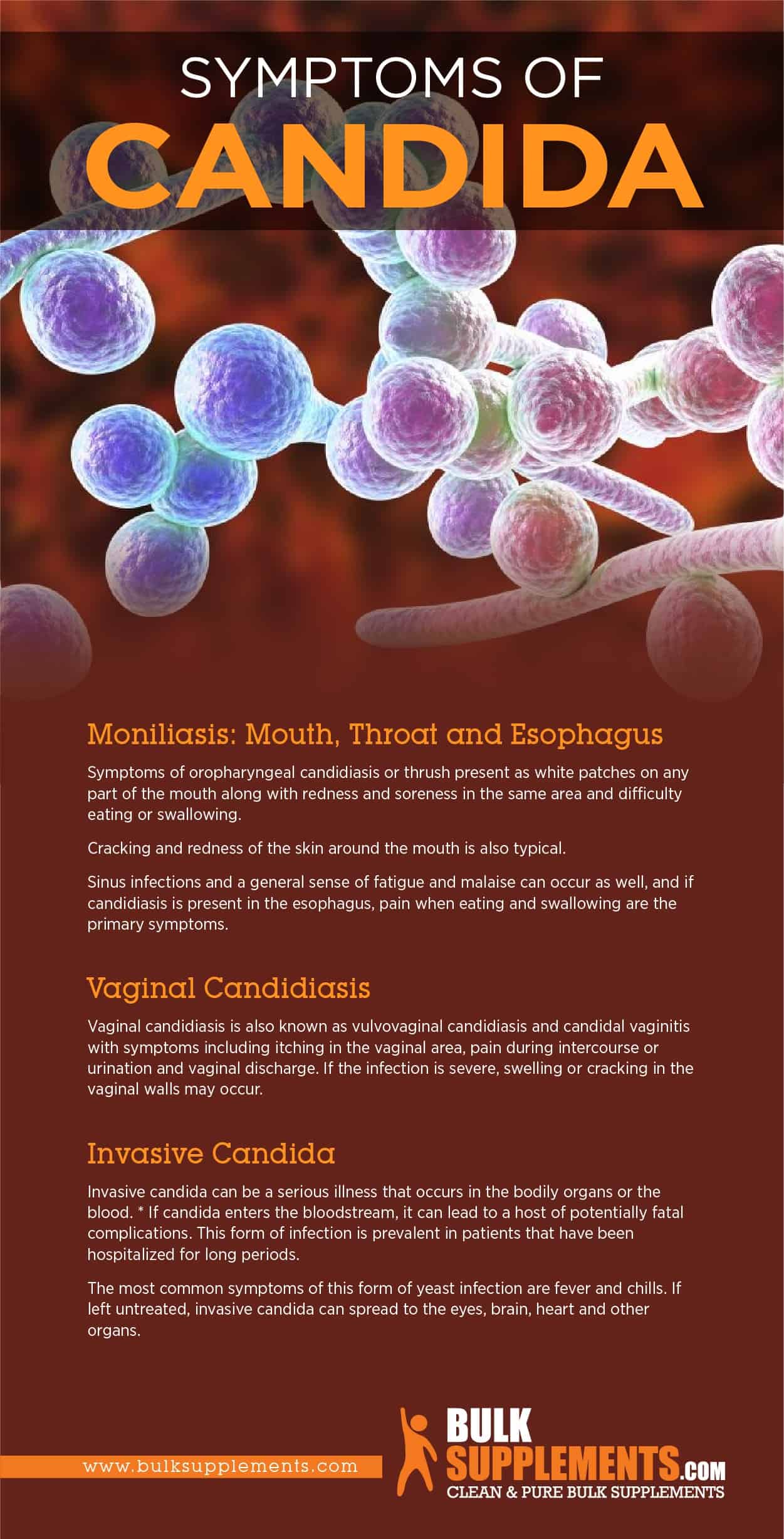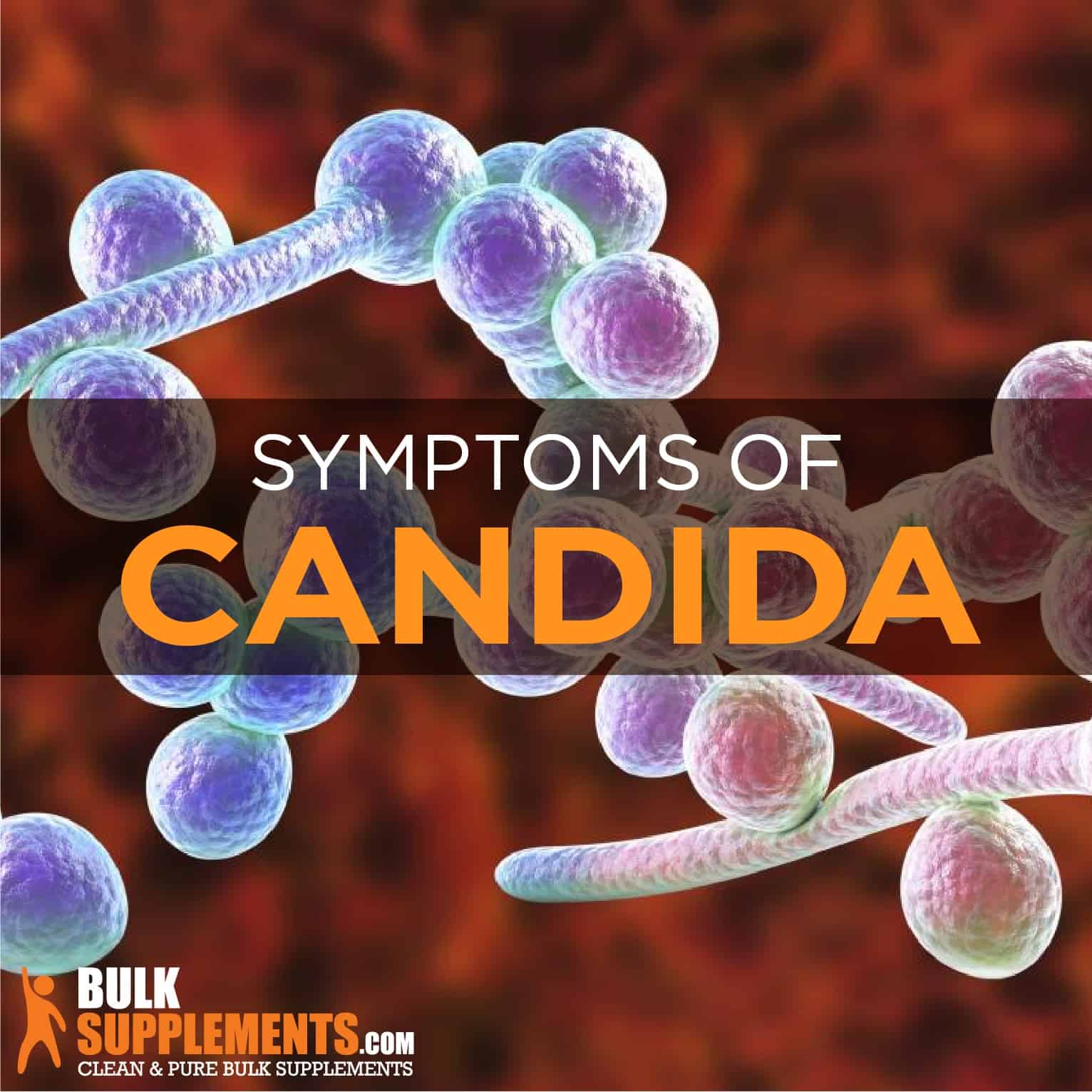What is Candida?
Candida, or candidiasis, is a common yeast infection that you may have as it affects millions of people around the world. Candida yeast lies dormant in your intestines, and you don’t have health concerns. However, yeast infections can appear on your skin or other organs when an overgrowth of the fungus occurs. (x)
Types of Candida
There are approximately 200 known types of candida yeasts. However, only around 20 of them affect humans. The most common forms of candida are topical skin fungus, vaginal yeast infections or mouth and throat conditions referred to as thrush or oropharyngeal candidiasis. There is also a less common internal form of candida, and if this reaches your bloodstream, it can cause a severe medical emergency known as invasive candidiasis. It’s a complex condition to treat and can be fatal if not managed effectively. (x)
Causes of Candida
If the environment in your body promotes fungal growth, you may develop an infection. Candidiasis in the mouth presents as white patches, soreness, and cottonmouth. When it appears in the esophagus, the most common symptom is pain while swallowing or eating. (x)
Research shows candida or yeast infections are an epidemic in the US. (x) Some causes of the epidemic include:
- Antibiotics
- Excessive dairy
- Sugar
- Carbohydrates
- Carbonated drinks
- Fast food
- Beer
- Birth control pills
Cutting these causes out of your diet will help prevent the occurrence of candida. If you have to take antibiotics, make sure you take prebiotics and probiotics as well.
Oral Candida: Mouth, Throat and Esophagus
A compromised or weakened immune system is the leading cause of oral Candida, also known as oropharyngeal candidiasis or thrush. People with diabetes, cancer, and HIV are particularly prone to this infection, as well as people who use dentures. Overuse of antibiotics and corticosteroids can also lead to a yeast infection in the mouth and throat. Based on a clinical study with 110 patients with human immunodeficiency virus infection, 33 patients developed it alone. (x)
Vaginal Candida
Vaginal candida is a common ailment among women, particularly those who use birth control pills or are pregnant. Evidence shows that the use of cotton underwear, cloth napkins and tampons may help prevent these infections. (x)
A clinical study performed on 92 pregnant and nonpregnant women by obstetric-gynecologic clinics investigated the cause of vaginal candida. Six factors showed the reason for the infection. They were obesity, drug addiction, birth control pills, pregnancy, diabetes mellitus and antibiotic therapy. (x)
Invasive Candida
Hospitals or nursing homes are more susceptible to invasive candida. The medical industry doesn’t consider it a contagious illness. Aging has a diminishing immune system, making it easier to catch infections. (x)
However, the elderly who are at higher risk for developing symptoms can contract the illness by being exposed to the fungus than those who never had candida.
Symptoms of Candida
A general sense of fatigue and illness can be present with all the forms of candida. More specific symptoms include: (x)
- Moniliasis: Mouth, Throat and Esophagus
Oropharyngeal candidiasis or thrush symptoms present themselves as white patches on any part of the mouth with redness and soreness in the same area, including difficulty eating or swallowing.
Cracking and redness of the skin around the mouth are also typical.
Sinus infections and a general sense of fatigue and malaise can occur as well. If candidiasis is present in the esophagus, pain when eating and swallowing are the primary symptoms.
- Vaginal Candidiasis
You can call it vaginal candidiasis or vulvovaginal candidiasis and candidal vaginitis. The symptoms include itching in the vaginal area, pain during intercourse or urination and vaginal discharge. If the infection is severe, swelling or cracking in the vaginal walls may occur.
- Invasive Candida
Invasive candida can be a severe illness that occurs in the bodily organs or the blood. If it enters the bloodstream, it can lead to a host of potentially fatal complications — those who have this form of infection endure long periods of hospitalization. The most common symptoms of this form of yeast infection are fever and chills. If left untreated, invasive candida can spread to the eyes, brain, heart and other organs. (x)

Natural Remedies and Candida Supplements
Traditional medicine is available to treat candidiasis with topical antifungal approaches such as clotrimazole, miconazole, or nystatin. There are, however, some very effective alternative treatments and natural supplements that prevent and treat it. Visit with your healthcare provider and discuss taking any new supplements. Some that may help include:
- Garlic Extract Powder
Garlic is an excellent natural remedy for treating yeast infections due to containing allicin. In addition to being an antifungal agent, it helps build up the immune system and maintain healthy yeast levels in the body. The recommended daily dosage is 650 mg of fresh or supplemental garlic with a meal, twice a day.
Research shows that fresh garlic is more effective against it. But if you only have the extract powder, that is effective as well. One such study was as early as 1947, reporting garlic inhibited fungal growth substantially. Another done in 1966 did extensive research in consuming garlic juice as a useful measure against the fungi. (x)
A randomized trial included 56 patients. They applied garlic paste for two weeks to treat oral candidiasis, which worked effectively. (x)
- Aloe Vera Extract Powder
Another promising treatment for candida is aloe vera. Studies have shown that aloe vera can act effectively as an antifungal agent. It also helps with several skin conditions and maintaining a healthy circulatory system. The recommendation to follow is 1,000 mg (round ½ tsp) daily.
A study performed with test tubes proved that aloe vera works as an antifungal agent. Using aloe vera to treat candida is a novel and promising idea. (x) International Journal of Medical Research & Health Sciences published an article detailing the positive effects aloe vera powder has on candida albicans concerning denture infections. The powder was most effective as an antimicrobial and helps manage gun diseases in general. (x)
- Pomegranate Powder Extract
Research shows that pomegranate acts as an antifungal agent and helps treat yeast infections. You can take it in extract form or as a supplemental powder. For the best benefits as an antifungal agent against candida, the suggested recommendation is to take 750 mg of pomegranate extract (just under 1/4 tsp) twice daily.
Research shows the effectiveness of treating candida with dried powder from pomegranate peels. Clearly, this powder has a high antimicrobial property that inhibits the growth of candida. Other studies show the positive results of treating oral candida and the valuable influence of gargling with pomegranate mouthwash. (x)
Where to Buy Supplements Candida Symptoms?
You can purchase these powders and supplements for improvement of general candida symptoms at BulkSupplements.com. The company is an industry-leading manufacturer and distributor of pure dietary supplements.
BulkSupplements.com is not just a consumer brand. It also supplies pure ingredients to other food and supplement brands to make their products. All products at BulkSupplements.com are manufactured and tested according to current and proper manufacturing practices.
Are you interested in trying any of these powders or supplements mentioned in this article as a possible solution to helping you with your symptoms? Contact BulkSupplements.com to place an order today.
Dietary Changes Relieve Candida
Another excellent form of treatment and prevention of candida is a change in diet. Avoid carbohydrates, processed food, and refined sugars, and eat plenty of fresh green leafy vegetables.
A study performed on mice given candida and then fed one group rodent food and the other a purified diet, nutritionally adequate. The purified diet inoculated the infection. (x)
Antifungal Mouthwash for Candida
As mentioned earlier, under pomegranate powder extract, antifungal mouthwash helps prevent oral candida by stopping the fungus from growing in oral cavities, leading to yeast infections.
A study performed using both essential oils and antifungal mouthwash proved as an effective means against oral candida. Cinnamon and lemon essential oils proved most effective. (x)
The Bottom Line
Candida, or candidiasis, is a common yeast infection that affects millions of people around the world. The most common forms of candida are topical skin fungus, vaginal yeast infections or mouth and throat conditions referred to as thrush or oropharyngeal candidiasis. Candida develops the system of the body that promotes fungal growth and can present itself in several ways according to the type of infection.
Some medical experts report it as an epidemic where doctors apply traditional medicine to treat candidiasis. They prescribe topical antifungal approaches. However, some very effective alternative treatments and natural supplements help prevent and treat it, such as garlic, aloe vera and pomegranate. A change in your diet may be the solution that solves your health concerns.
These statements have not been evaluated by the Food and Drug Administration. These products are not intended to diagnose, treat, cure or prevent any disease.


